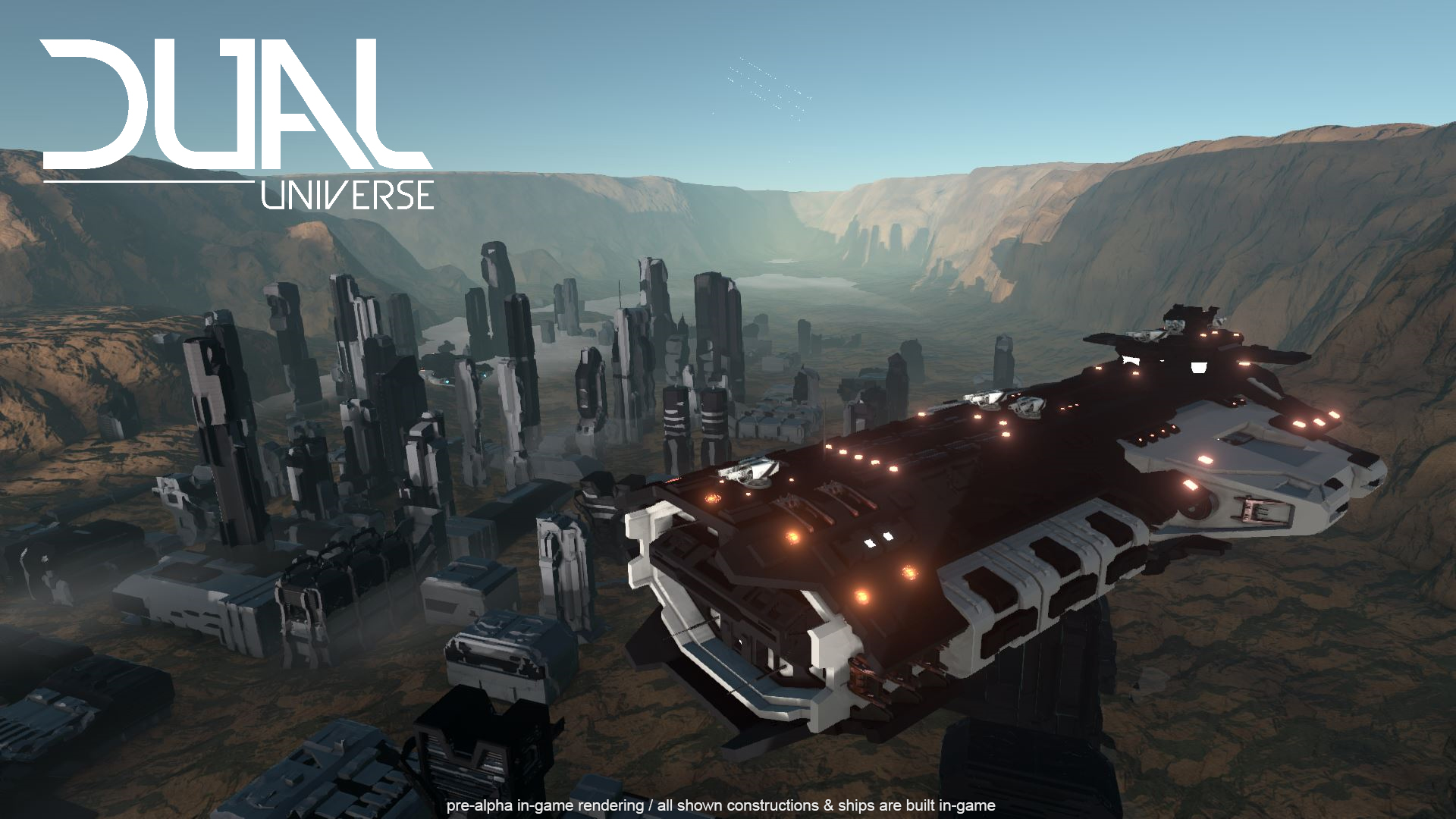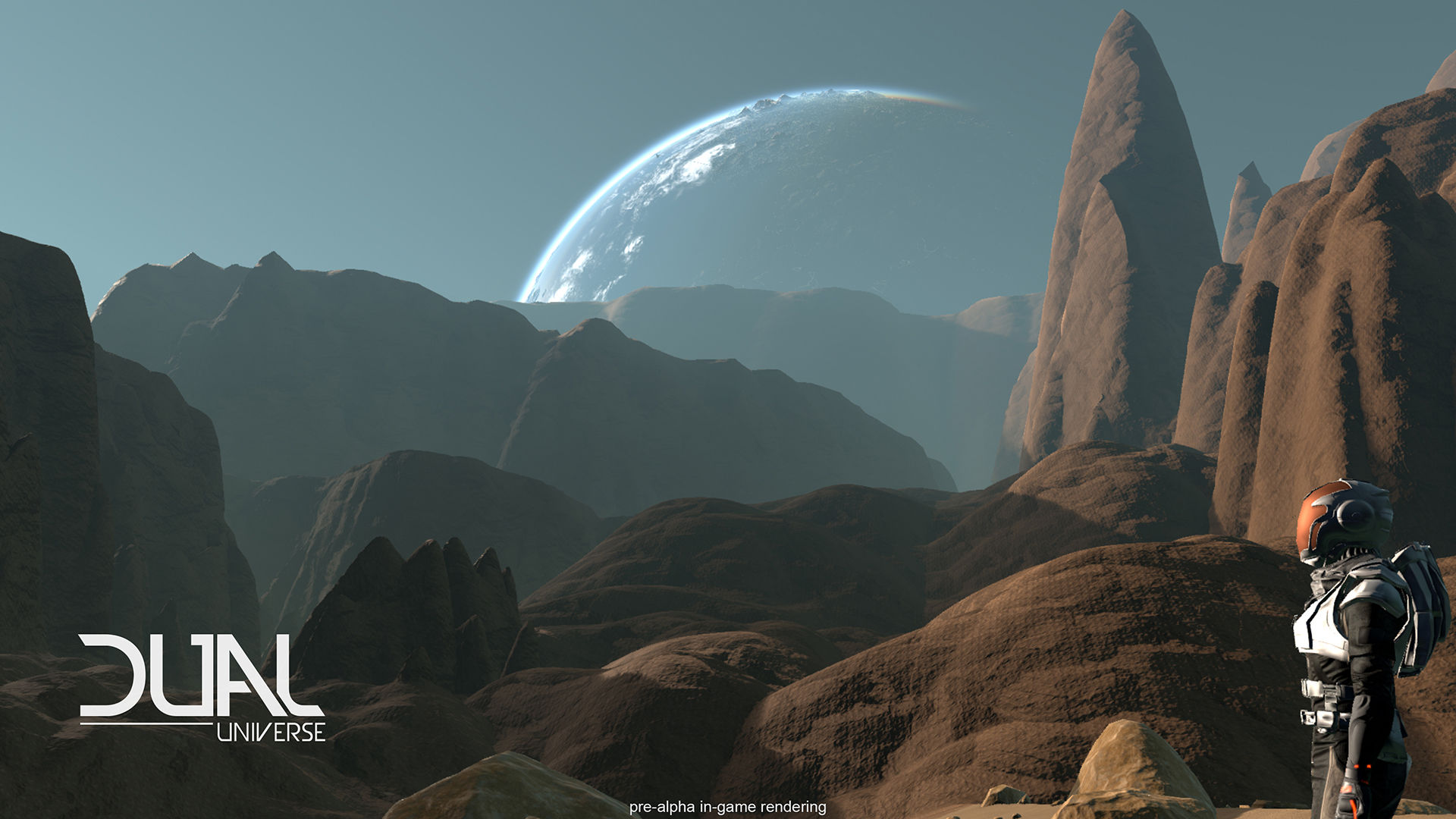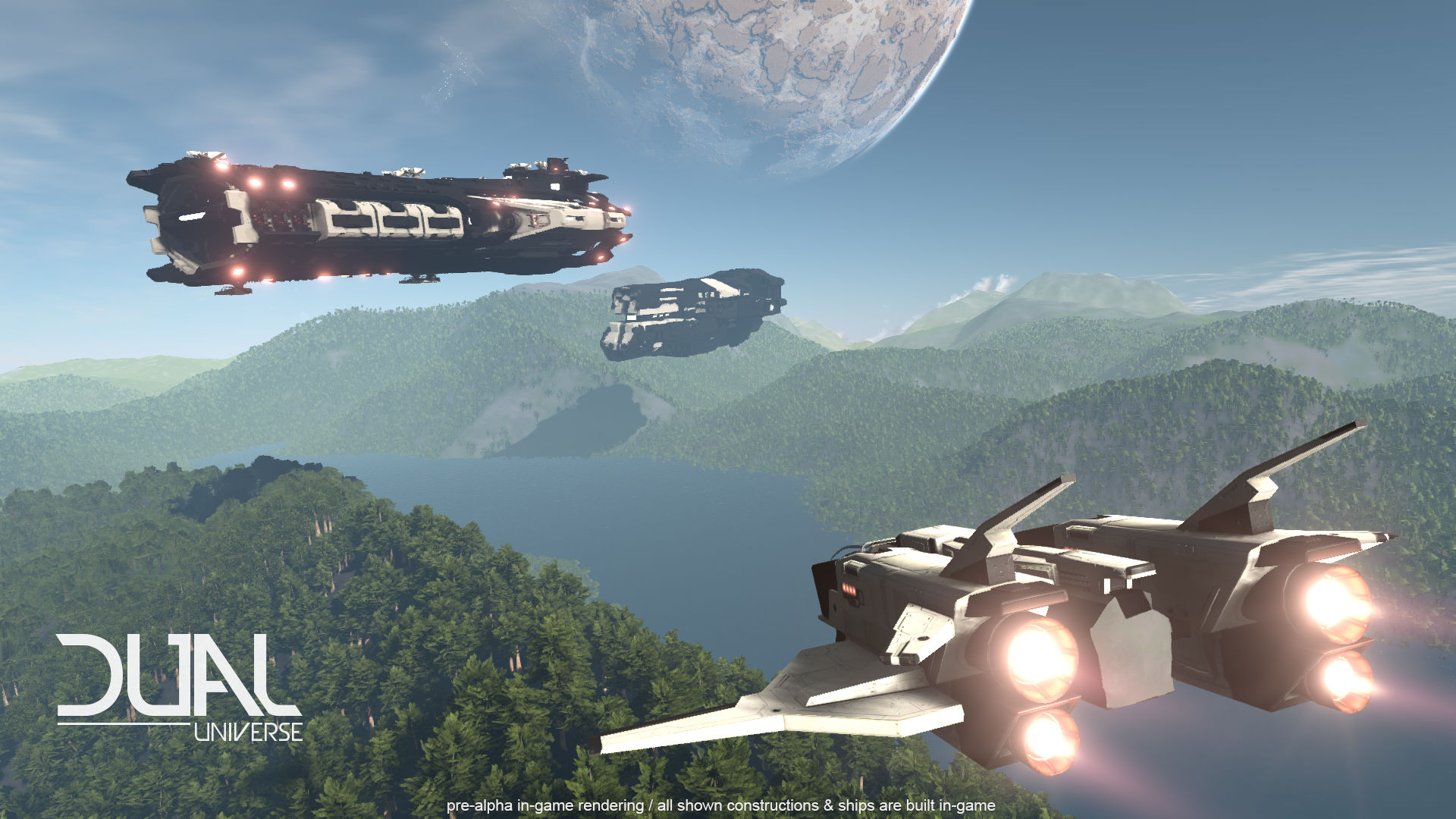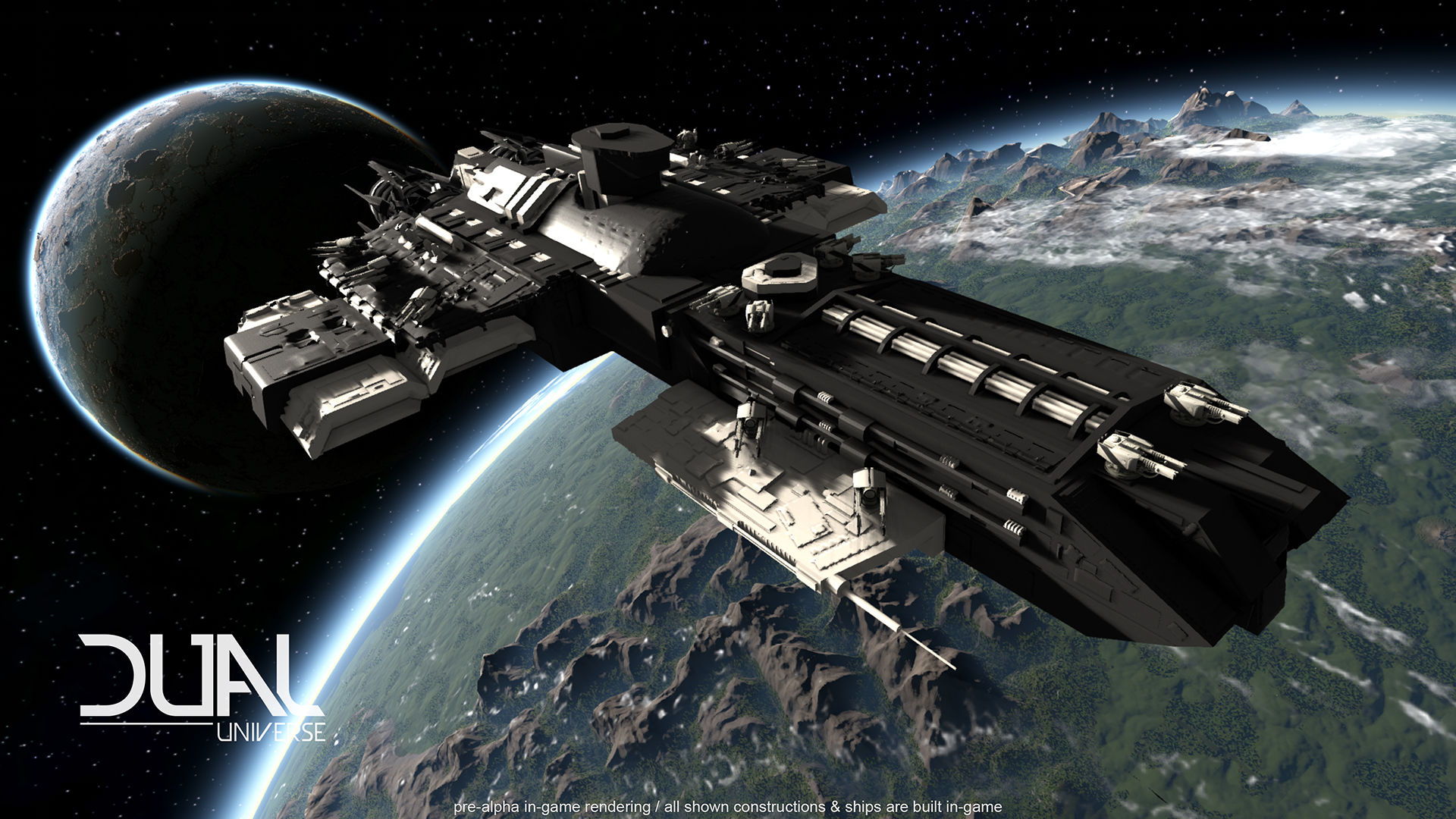How do you build a massively ambitious space game in a post-No Man’s Sky world?
A closer look at Dual Universe, the daring MMO that wants roll together EVE Online and Minecraft.
Creating a big, emergent space exploration game is hard enough, but it got a lot harder after the release of No Man’s Sky last month. In the wake of criticism of unfulfilled promises and hyperbolized features, the internet created a black hole of skepticism. And for the foreseeable future, any space game promising some form of infinity will have to find a way to escape its gravity.
French developer Novaquark isn’t naive to the skepticism that it’s launching a very ambitious Kickstarter project into. Dual Universe is one part EVE, one part Minecraft: a 3D, ‘single-shard’ MMO where everyone plays on the same server across millions of planets. Any of these worlds can be built upon or carved away by players through voxel tech, and pieces of them can be claimed like property. You can freely construct your own ships or space stations from scratch and sell those designs as blueprints. You can invite your friends to occupy or operate different parts of these creations, or write your own Lua code to script the behavior of in-game objects like weapon turrets. In-game markets will create supply and demand for resources, inspiring players to make their own jobs, organizations, and empires.

Even individually, some of these ideas are the basis for entire existing games. Imagined together, they are audacious. But Novaquark, which currently has about 25 employees, believes in them.
Should we doubt them? At least a little. However, after spending more than an hour watching Dual Universe played, two things are alleviating my skepticism. One, Dual Universe’s boldest ideas are arising from its tech, not the other way around. “You can’t add ‘MMO’ as an afterthought,” Novaquark creative director and founder Jean-Christophe Baillie tells me during an hour-long demo. “Every single thing in the game is tightly tied to the server tech. It’s not like you can add that afterwards. I think we took the problem from the right angle.” At this primordial stage, Novaquark has demonstrated how its server technology should be able to handle many players occupying the same area.

From the Dual Universe website: "Dual Universe is an ambitious, long-term project. We aim to have a playable alpha version open to a limited number of people in the second half of 2016. There will be different ways to be selected, see the forum for details. Typically a game of this size will take 12-24 months from alpha to full launch. You can expect a beta phase for the second half of 2017 and an official release in 2018. After the release, development will continue as the idea of Dual Universe is to create a lasting game that will evolve with its player base."
Second, although I haven’t seen a populated world myself, Novaquark isn’t camouflaging the current state of the game. The gameplay walkthrough I’m given closely resembles this July video, and it’s unapologetically evident that, right now, Dual Universe isn’t far past its origins as a tech demo. It’s encouraging to have that kind of transparency at the outset from a project of this nature. “The only thing we can do is to communicate properly,” Baillie tells me. “People will extrapolate … but the only remedy for that is to have clear communication and have gameplay at the beginning that’s good. And also to show progress, I think.”
Baillie is careful to say what Dual Universe isn’t as much as what it is. For example, it won’t have much of a story, or be populated with a bunch of NPCs, like most MMOs. There may eventually be animals that you can encounter on the planets, but it won’t be a defining feature, Baillie is comfortable saying. There may not even be quests, apart from jobs that players themselves offer to one another.

Baillie hasn’t spent his career developing games—he actually has a background in robotics and AI—but based on his praise of player-authored storytelling you could probably guess that he’s a massive fan of EVE Online, one of Dual Universe’s big inspirations. Like EVE, he says, he wants to stage the development of Dual Universe over the course of several expansions—it’s an experience that Novaquark plans to create over a long period. “It’s something that is meant to evolve … If you look at EVE Online, they’ve been there for more than 10 years, so there’s a lot of time to introduce interesting developments, and to listen to the community and orient your priorities,” he says. “This is the philosophy, the way we want to build: we want to start quite small in features and in the number of people that might be in the game. And draw progressively something solid that is getting more and more refined over time.”
The biggest gaming news, reviews and hardware deals
Keep up to date with the most important stories and the best deals, as picked by the PC Gamer team.
Life signs
In the pre-pre-alpha build I’m shown, choppy framerate and all, there are are couple moments of legitimate beauty. The way the halo of atmosphere that surrounds each planet blooms out into space. The way that the biggest geological details of the planet aren’t abstracted away when we move out into space—the peaks of a mountain range are plainly visible from orbit.
Oppositely, the freedom to dig in Dual Universe seems interesting. Late in the demo, Baillie burrows a hole a few dozen meters underground, easily carving out a wide tunnel with one of the game’s world editing tools. He starts speculating with confidence about the players who will decide to, in this game of millions of planets, build, live, and work underground. As a restriction, he says, maybe you’ll need some kind of oxygen tank or other equipment to move deep underground. Not every planet will contain every type of resource, and mined resources won’t respawn in Dual Universe, he tells me, speculating that prospecting and scouting could become as valuable a role as mining. Although it hasn’t been developed, Novaquark wants to make scanning for resources into an interesting challenge.

For the most part, appealing concepts like this haven’t left the imagination stage. But another that I’m curious about is Novaquark’s idea about how to make the act of exploration into a series of big milestones. On paper, it’s a design that’s completely in opposition to No Man’s Sky’s instantly empowering, effortless movement between stars. Novaquark wants space exploration to be about the journey rather than the destinations.
“It won’t be, after one hour of gaming, that you can fly in a ship and go everywhere you want. It’s going to be an achievement, the first time you go in space,” says Baillie. “I want people at home to say ‘Wow, I made it.’ That’s very important. It’s not going to be a casual game where you just finish in a few hours. It should be a real journey.”
The only thing we can do is to communicate properly.
Jean-Christophe Baillie, founder
At the outset of the project, Dual Universe probably won’t allow players to travel between systems at all. As development continues, stargates will be introduced as a feature, but players will have to build them themselves. This could take a long time, Ballie says, weeks or a month, perhaps, plus the time needed to acquire all the resources necessary to construct a stargate. And when the interstellar portal is finally built, it’s up to the owner to decide who gets to use it.
“The stargate is an asset. It belongs to someone or some organization, and as such the owner has the right to set rights of usage,” says Baillie. “You can actually get people to pay a fee to use a stargate, so you can make a business out of building a network of stargates. You’re running a highway through the galaxy and you make people pay for access. Or on the other hand you could have a private organization that has its own stargates, only for its members.”
Novaquark’s plans raise enormous technical and design questions, and we should be at least a little skeptical about an upstart studio’s bold vision for a boundless, player-run, fully editable universe. But the big ideas driving Dual Universe are compelling, partly because they reflect PC gaming’s spirit as a platform of openness, freedom, and player-authored stories.
For now, Novaquark has demonstrated that its tech can support some of its ambitious schemes: editable terrain, spaceship and space station building, and hundreds of server-connected bots simulating players. From there, it’ll take the right balance of honesty and optimism to make the next generation of EVE Online.

Evan's a hardcore FPS enthusiast who joined PC Gamer in 2008. After an era spent publishing reviews, news, and cover features, he now oversees editorial operations for PC Gamer worldwide, including setting policy, training, and editing stories written by the wider team. His most-played FPSes are CS:GO, Team Fortress 2, Team Fortress Classic, Rainbow Six Siege, and Arma 2. His first multiplayer FPS was Quake 2, played on serial LAN in his uncle's basement, the ideal conditions for instilling a lifelong fondness for fragging. Evan also leads production of the PC Gaming Show, the annual E3 showcase event dedicated to PC gaming.

